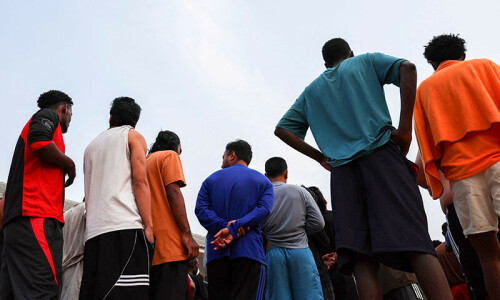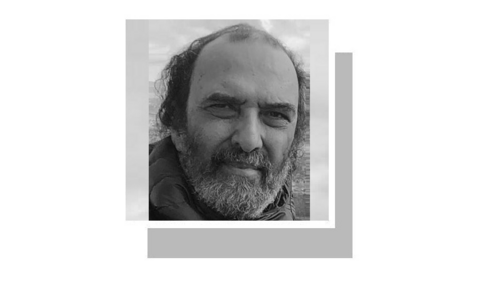Military courts have sentenced 25 civilians to prison terms ranging from two to 10 years for their involvement in violent attacks on military installations during nationwide riots on May 9, 2023, according to a statement issued by the Inter-Services Public Relations (ISPR) on Saturday.
The development comes over a week after the Supreme Court’s constitutional bench conditionally allowed military courts to pronounce the verdicts of 85 under-custody civilians in cases pertaining to the May 9 riots.
What we know so far:
- Punishments range from 2-10 years, with 14 of 25 given maximum sentences
- All convicts retain right to appeal and other legal recourses, military says
- PTI ‘rejects’ sentences
- Ministers hail verdicts, with Asif calling for ‘planners’ to be punished
- Lawyers concerned if due process followed, hope for fair trials
Following today’s announcement, persons who can be released after remissions can “be released forthwith and the persons who have to yet undergo the sentence awarded to them, their custody” will be handed over to the “concerned jail authorities”, as per the SC order.
The bench had ordered that the announcement of judgements would be subject to a final determination of the appeals before the SC, and without prejudice to the rights of those 85 accused persons.
During the December 13 hearing, Additional Attorney General Amir Rehman had assured the court that the prisoners would be dealt in accordance with the jail manual. However, the bench did not agree when the counsel for the petitioners requested the SC that the prisoners be placed under the custody of a civilian court.
Following the arrest of the ex-premier on May 9, 2023, from the Islamabad High Court’s premises by paramilitary forces, riots erupted across the country that went on for at least 24 hours.
The convictions announced today primarily relate to attacks on several key military sites, including Jinnah House, General Headquarters (GHQ) in Rawalpindi, and Pakistan Air Force (PAF) Base Mianwali.
In its statement today, the military said, “In light of the Supreme Court decision, Field General Court Martial (FGCM) have in first phase promulgated the punishments to following 25 accused; after examining all evidence, affording all legal rights to the accused and completion of due process.”
In this first phase of sentencing, the military courts have handed down punishments ranging from two to 10 years of rigorous imprisonment.
“All convicts retain the right to appeal and other legal recourses, as guaranteed by the law and the Constitution,” the ISPR said.
It further said that “promulgation of the sentences of remaining accused is also being done and will be announced shortly as and when the due process is complete”.
The ISPR also released a video showing the convicts and their deeds for which they had been sentenced.
The military said the events of May 9, 2023 were “politically provoked violence and arson at multiple places, marking a dark chapter in the history of Pakistan”.
“Building on a sustained narrative of hate and lies, politically orchestrated attacks were carried out on the installations of the armed forces including desecration of the monuments of shuhada,” the military said.
“These blatant acts of violence not only shocked the nation but also underscored [the] necessity of checking this unacceptable attempt of political terrorism to impose own perverted will through violence and coercion,” the statement added.
It noted that on Dec 13, 2024, a “seven-member constitutional bench of the Supreme Court of Pakistan directed that the cases pending due to an earlier order of the Supreme Court be finalised and judgements in the cases of those accused found involved in these violent incidents be announced”.
The ISPR statement read: “Sequel to the events of this ‘Black Day’, through meticulous investigations, irrefutable evidences were collected to legally prosecute the accused involved in the 9th May tragedy.
“Certain cases were subsequently referred for Field General Court Martial (FGCM) as per law, where they underwent trials following due process,” it added.
“This is an important milestone in dispensation of justice to the nation,” the military asserted.
It continued: “It is also a stark reminder to all those who are exploited by the vested interests and fall prey to their political propaganda and intoxicating lies, to never take law in own hands ever in the future.”
The ISPR noted: “Many accused are also being tried in various Anti-Terrorist Courts and their cases are being pursued as per the law, however, justice would truly be fully served once the mastermind and planners of 9th May Tragedy are punished as per the Constitution and laws of the land.
“State of Pakistan will continue to [vigorously] pursue dispensation of justice to ensure establishment of inviolable writ of the state, so as to uproot this evil of violence driven disruptive and destructive politics based on hate, divisiveness and baseless propaganda,” the military vowed.
At least 10 people lost their lives and hundreds sustained injuries, while approximately 40 public buildings and military installations were damaged, including Lahore Corps Commander’s House (Jinnah House) and Askari Tower in Lahore, General Headquarters (GHQ) in Rawalpindi, Inter-Services Intelligence (ISI) Office in Faisalabad, FC Fort in Chakdara, Radio Pakistan building in Peshawar, Toll Plaza at Swat Motorway and the PAF Base Mianwali.
In total, 62 outbreaks of violence were documented, inflicting a loss of Rs2.5 billion on the country, of which, according to the state, Rs1.98bn in losses were suffered by the army. The military says the events were a coordinated attack by the PTI leadership.
In its widely praised verdict, a five-member bench on Oct 13, 2023 had unanimously declared the military trials of 103 civilians null and void.
The apex court had declared that the accused would not be tried in military courts but in criminal courts of competent jurisdiction established under the ordinary or special law of the land.
However, on December 13 last year, in a 5-1 majority verdict, the SC conditionally suspended its own Oct 23 ruling — albeit by a different bench — pending a final judgement as it heard a set of intra-court appeals (ICAs).
Earlier in March, a six-member SC bench had also conditionally allowed military courts to pronounce reserved verdicts in the cases. It had also modified its Dec 13 injunction, ordering that military courts could commence trials but they would not convict or acquit any suspect until the pendency of government-instituted ICAs.
Punishments range from 2-10 years
Ten-year sentences were handed down to 14 of the 25 persons convicted, with one each given nine-year, seven-year, and three-year terms; six years to two; four years to another two; and two years to four.
Out of the total convictions, 11 were linked to the attacks on Jinnah House; five to Punjab Regimental Centre Mardan; two each to GHQ, PAF Base Mianwali and Multan Cantt Check Post; and one each to Chakdara Fort, ISI Office Faisalabad incident, and Bannu Cantt.
Among those receiving maximum sentences are Jan Muhammad Khan and Muhammad Imran Mehboob for the Jinnah House attack, Raja Muhammad Ehsan for the GHQ incident, and Anwar Khan for involvement in the PAF Base Mianwali attack.
According to the press release, the following 25 people were handed down the sentences:
- Jan Muhammad Khan — involved in Jinnah House incident (10 years)
- Muhammad Imran Mehboob — involved in Jinnah House incident (10 years)
- Raja Muhammad Ehsan — involved in GHQ attack incident (10 years)
- Rehmat Ullah — involved in Punjab Regimental Centre Mardan incident (10 years)
- Ali Iftikhar — involved in Jinnah House incident (10 years)
- Zia ur Rehman — involved in Jinnah House incident (10 years)
- Adnan Ahmed — involved in Punjab Regimental Centre Mardan incident (10 years)
- Shakir Ullah — involved in Punjab Regimental Centre Mardan incident (10 years)
- Anwar Khan — involved in PAF Base Mianwali incident (10 years)
- Abdul Hadi — involved in Jinnah House incident (10 years)
- Ali Shan — involved in Jinnah House incident (10 years)
- Daud Khan — involved in Jinnah House incident (10 years)
- Umar Farooq — involved in GHQ attack incident (10 years)
- Babar Jamal — involved in PAF Base Mianwali incident (10 years)
- Muhammad Afaq Khan — involved in Bannu Cantt incident (nine years)
- Daud Khan — involved in Chakdara Fort incident (seven years)
- Faheem Haider — involved in Jinnah House incident (six years)
- Muhammad Hashir Khan — involved in Jinnah House incident (six years)
- Zahid Khan — involved in Multan Cantt Check Post incident (four years)
- Muhammad Ashiq Khan — involved in Jinnah House incident (four years)
- Khuram Shahzad — involved in Multan Cantt Check Post incident (three years)
- Muhammad Bilawal — involved in Jinnah House incident (two years)
- Said Alam — involved in Punjab Regimental Centre Mardan incident (two years)
- Laeeq Ahmed — involved in ISI Office Faisalabad incident (two years)
- Yasir Nawaz — involved in Punjab Regimental Centre Mardan incident (two years)
PTI ‘rejects’ sentences, ministers want ‘planners’ punished
Following the announcement, Opposition Leader in the National Assembly Omar Ayub said the sentences “against PTI detainees are repugnant to the norms of justice”.

“Military court sentences against civilians rejected!!!” Ayub wrote on X.
“The detainees are civilians and cannot be tried by military courts,” he asserted, calling the courts “kangaroo courts”.
“Military courts cannot lawfully share the judicial power of the state because the armed forces are part of the executive authority of state and the creation of such courts to try civilians for ordinary civil offences ‘not only militates against the independence of judiciary but it also negates the principle of trichotomy of power which is the basic feature of the Constitution’,” the PTI leader said, citing SC’s verdict in the 1999 Sheikh Liaquat Hussain case.

Meanwhile, a post on Imran’s official X account — which the incarcerated ex-premier does not personally have access to — reiterated the PTI’s allegation that the May 9 events were an “organised” conspiracy against him and his party.
The post added, “Punishing innocent citizens by acting as judge, jury, and executioner through a military trial, after staging May 9 false flag operation themselves, is a blatant violation of human rights.”
It called on international organisations to take notice of the “miscarriage of justice committed in the name of military trials”.
Senior PTI leader Taimur Khan Jhagra said: “No one is going to accept these trials as fair. And those defending them will also be doing so out of compulsion.”
He noted there was “no visibility of these trials”, adding, “with the pressure being exerted on the conventional judiciary today, these sentences and the accompanying campaign on TV belong to some Sacha Baron Cohen movie”.
The PTI’s United States chapter said on X that “colonels and majors, acting as judges, have sentenced civilians it tried in military courts”.
“These civilians were held for over a year in harsh conditions, with many tortured into giving false confessions,” it alleged.
On the other hand, Defence Minister Khawaja Asif said on X that the “delay in the sentencing had boosted the morale of the accused and their facilitators”.

Claiming that the convictions were only for those “used” in the riots, the PML-N leader said the matter “would not end until the law reached those who were the planners of this terrible day”.
“The enemies of the country will continue to boost the morale of such elements,” Asif added.
Information Minister Attaullah Tarar criticised Imran for inserting “division and hatred into politics”.
“Those who did political terrorism, under the guise of politics, today they have been brought to their logical conclusion,” he said, speaking at an event in Lahore.
“It has been proved that the mastermind of May 9 was the PTI founder,” Tarar claimed. “No one from those who worked against this country’s well-being will be let go.”

“Political differences are raised through arguments,” the minister stressed. “All these [convicted] people are those who strengthened the enemy by attacking military installations,” he asserted.
In a post on X, Tarar said the sentences had “not only established the rule of law but also set an example for the future so that no one dares to do such a despicable act”.
“This is a clear message to state enemies,” the information minister stated, sharing the video released by ISPR of the convicts’ details.
Lawyers concerned, hope for fair trials
Commenting on today’s development, Barrister Asad Rahim said: “We have entered uncharted territory, where what is left of our Supreme Court is allowing a system of laws to be imposed without any state of exception or emergency.”
“Pakistan’s constitutional order will greatly suffer for this,” he remarked.
He termed the Oct 23, 2023 original decision as a “landmark verdict, uphold as it did the principle that civilians are to be tried by civilian courts”.
“What we have now is its reverse: the first and so far only significant gift of this new constitutional bench has been to upend that consensus,” Rahim lamented.
Lawyer Basil Nabi Malik said military trials were an “an abomination for any country that prides itself on being a federal polity with democratic credentials”.
“The proceeding of such trials, along with the lethargy of the Supreme Court in actually deciding the matter conclusively, indicates that Pakistan is leaning towards being a democracy in name only as opposed to being one in practice,” Malik told Dawn.com.
“This should be worrying for all concerned, not least of all the political parties who claim to be champions of democracy and the people’s rights,” he added.
Barrister Rida Hosain pointed out that so far, “not a single civilian in custody has been acquitted by the military courts”.
Noting that prior to today’s 25 sentences, judgments for 20 people had been announced in April, she said, “The disproportionately high conviction rate in military courts reinforces the unfairness of the proceedings.”
On the ISPR stating that the convicts “retain the right to appeal and other legal recourses”, Hosain said, “There is no independent right of appeal against decisions of military courts. A right to appeal lies within the military system.
“However, the high courts may review the decisions handed down by military courts on very limited grounds such as lack of jurisdiction, mala fide etc,” she added.
Regretting that constitutional bench’s decision last week, she said the “appellate bench has allowed an unconstitutional process to continue without a decision on the merits”.
Barrister Yasser Latif Hamdani hoped that the sentences could be appealed so that the right of fair trial under Article 10A of the Constitution was protected by judicial oversight.
Hamdani noted: “There is no cavil with the proposition that those responsible for violence and rioting on May 9, 2023 should be held accountable.”
However, he added the right to fair trial was a fundamental right under the Constitution and expressed the hope “that the military court procedure can be held up against that right”.
Lawyer Mirza Moiz Baig said the convictions “once again engenders concerns about due process”.
“While the civilians sentenced today may, in fact, have been involved in the acts of May 9, 2023, our democratic dispensation rests on giving even those accused of heinous crimes the right to a fair trial,” he noted, emphasising that the “commitment to uphold such principles when dealing with the most violent crimes is really what distinguishes democratic dispensations from oppressive ones”.
Advocate Ahmad Maudood Ausaf said the Pakistan Army Act of 1952 was “never meant to drag civilians into its fold”.
He noted: “Justice Ayesha Malik, in her initial judgment, flagged the glaring lack of impartiality and independence in military trials — a critique hard to ignore when you consider the sky-high conviction rates that make the entire process look less like justice and more like a rubber-stamp factory.”
Also mentioning the 26th Amendment, under which the constitutional bench hearing the case currently was formed, Ausaf said, “It’s difficult to say whether such a development would have been possible under the pre-amendment status quo.
“Would the outcome have been the same if constitutional cases weren’t left to a select few? One can only speculate. The amendment undeniably set the stage, doubling as both a trigger and a catalyst.”
However, he noted that the right to appeal “still stands, offering a glimmer of hope through the high court and, eventually, the Supreme Court. The path ahead is unclear, but this story is far from over.”














































